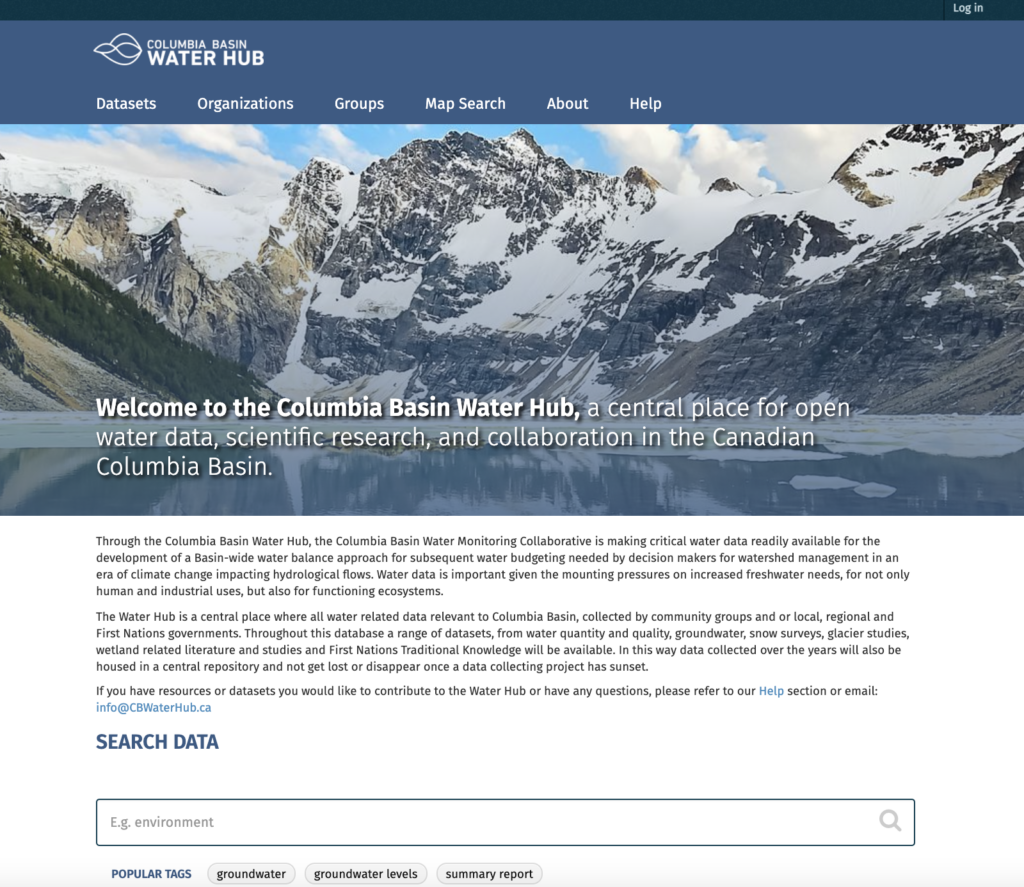An open-source database now makes critical water data readily available for water stewardship groups and decision-makers in the Upper (Canadian side) Columbia Basin!
The recently launched Columbia Basin Water Hub acts as a central repository for water-related data relevant to the region. Water datasets collected by community water monitoring groups are now available to support decision-makers who are required to make freshwater allocation decisions and apply progressive watershed management in the era of climate change.
“Water monitoring efforts within the Basin have been taking place for a long time and unfortunately over the years, some data may be getting lost between the cracks. Our aim is to be a container for all the past information collected as well as for current and future water data,” says Columbia Basin Water Hub manager Santiago Botero. ”We want to ensure access and longevity for the data and by providing a platform for storing data and curating with quality control. We aim to empower a water-literate constituency, putting a focus on water issues that affect specific communities and areas in a basin with varied topography, climate, water bodies, and cultures.”
Climate change, in addition to human and industrial uses, is taxing freshwater supply.
In the face of these pressures, collecting water data to help monitor water use and distribution is essential to balance the freshwater needs of citizens, industry, and ecosystem services. Yet, British Columbia currently lacks a comprehensive and collaborative, province-wide approach to water monitoring. The development of the Columbia Basin Water Hub and the affiliated Columbia Basin Water Monitoring Collaborative was initiated to coordinate and support efforts by community groups in the region and build a coordinated approach to help answer local and regional questions about current and future hydrological conditions.
“My role as data manager is centralized around the testing and finalization of the database, as well as developing various processes for data management, uploading, curating, and stewardship,” explains Santiago. “I also aid groups to upload and manage their data priorities and needs. In this way, we hope to knit together a collaborative approach to help fill water data gaps in the Columbia Basin.”

The challenge, as always, is supporting people in adopting this new technological platform.
Living Lakes Canada, the facilitator of the Water Hub, hosted a three-part webinar series in December 2020 that introduced the database and its capabilities to over 30 individuals representing active community-based water monitoring groups, local and regional government, consultants, and First Nations. Participants learned about the Water Hub’s open-source database service CKAN (Comprehensive Knowledge Archive Network) and were guided through functions of data formatting and uploading, downloading, and analysis. The webinar series also included an overview of the vision and purpose of the Water Hub, a review of data standards, and an interactive Q&A. Recordings of the webinars were provided to participants upon completion of the series, and are available in the Water Hub’s “Help” section along with a User Manual and data templates.
“The webinar series was also an opportunity to receive feedback from future data hub users to ensure a more dynamic database that is better aligned with the needs of communities and groups within the Columbia Basin,” says Santiago.
Participants’ reactions to the platform’s capacity and functionality were unanimous.
“This is really cool. Can’t wait to have our data actually organized and useful!”
“Super impressive work!”
“The backend of the data hub has so many opportunities and seems to be compatible with a huge variety of programs and systems. It is impressive to learn about its compatibility.”
However, there was also shared concern around the perceived complexity of the data formatting process and the limited capacity of mostly volunteer-run organizations. “We will probably need assistance with data entry when our time comes,” commented one monitoring group representative.
“I reassured participants that in-depth knowledge to work in this database is not a prerequisite – that’s why I’m here. My role is to provide as much support and training as needed, whether that is with helping with uploads and templates, metadata, data sharing agreements, or setting up a data management strategy to go along the Water Hub,” says Santiago.
To learn more about the Columbia Basin Water Monitoring Collaborative and Water Hub, see the Columbia Basin Water Hub Handout. Questions? Please email Santiago at santiago@livinglakescanada.ca.